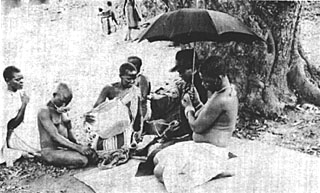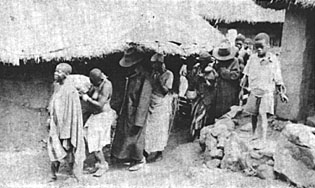| THE DRAMA OF THOVHELA AND TSHISHONGE
|
|
|
| Dzimani - a doctor (nanga) of repute with a crippled leg. (This role is usually played by the woman in charge of initiation) |
| Maluwe-wa-mmphwa-mashango - his wife who is mentally sick |
| Madavhula Sananga - a diviner (mungome) who has all but two of his fingers missing, because they were eaten by a leopard when he was hunting |
| Nyamuofhe - Madavhula's wife, who falls in love with Dzimani |
| Vho-maine Mashashule - a specialist (maine) in unravelling cases of divorce: a specialist in the medical, rather than the legal, sense |
| Chief Thovhela - who should carry a knobkerry |
| His young wife (mu |
| Chief Tshishonge - who should carry a bow and arrow |
| His young wife |
| Mutshena (or Mukudanyi ) Thovhela's dog |
| Mashango (or Zwimbiluni )- Tshishonge's dog |
| I. Introduction
The players came into the public place from the headman's homestead. In front came a woman blowing the kudu horn, followed by Madavhula Sananga and his wife, all of whom were dancing. The rest followed in a solemn procession: a woman of Thovhela's court preceded his young wife, who walked with her head bowed to the left and carried a covered basket (mufaro) more or less in front of her right shoulder; then came Chief Thovhela himself, dressed in a black hat and raincoat, and another wife who walked behind him, holding an umbrella over his head. After them, in a separate group, came Dzimani, who walked with a stick to signify his lameness, smoked a pipe and wore a cap to signify his manliness, and was festooned with little gourds that were supposed to contain medicines and seeds to sprinkle over the novices; Chief Tshishonge, with his head bowed, wearing a light brown hat and raincoat, followed by his wife, who carried a scarlet cloth in her hands; the novices who played respectively Thovhela's and Tshishonge's dogs; a married woman carrying a mat for Thovhela, three more women, and a fourth carrying a mat for Tshishonge. Dzimani's wife ran independently around the procession and out into the public place. As they emerged, they sang Song No. 1.
Madavhula's wife, Nyamuofhe, was so impressed by Dzimani's dancing, that she fell in love with him. Madavhula implored her not to leave him, saying, "I am a helpless person: I cannot live without you. My fingers were eaten by a leopard whom I encountered when I was hunting." Dzimani threw the divining dice, and pretended to turn up in succession the combinations vhukata, murubi, and tshipakate. As a result, Nymuofhe stayed with him, but she complained about his crippled leg. "Be quiet," replied Dzimani; "a thorn pierced my foot." Throw the Venda divination dice Madavhula tried again to persuade Nyamuofhe to come back to him, and Mashashule, the specialist, threw the dice, which confirmed that Nyamuofhe could stay with Dzimani, so that Madavhula Sananga was defeated. At this point the remaining two novices were brought out of the council hut and made to sit together near chief Thovhela. Both chiefs sat with their entourages at some distance from each other in the shade of the tree. Each chief had with him his newly married wife, and both were childless. (A child which Thovhela happened to have on his knee was the real-life child of the woman who was playing the part!) All were busy preparing for a communal hunt (fulo). |
| II. The hunt
When everyone, except the chiefs and their wives, went out hunting, Dzimani, stayed behind and gave Nyamuofhe special medicine (muuluso) to prevent the influence of her association with her former husband, Madavhula, causing her to return to him. The hunting party was preceded by the woman blowing the kudu horn; then followed the novices, a woman carrying a closed basket, and several others in single file. They all gave hunting cries intermittently, "Sa, sa! Dzhia, dzhia!" After a while, the party stopped, the basket was opened, and the disguises of dogs' teeth were taken out and fitted on to two novices. The base of each of these was made with grass such as is used for tinder (hatsi ha pfukwi); this had been tied up with strips of the wild fig tree (muhuyu = Ficus capensis Thunbg.), to make a small ring like a quoit. On to one side of this were fixed the teeth, made of white thorns (mupfa-mutshena), and the whole device was attached by a string which was pulled over the ears and tied at the back of the head. The dogs ran all over the fields, followed by the hunters; and eventually Thovhela's dog, Mutshena, killed a kudu (tholo), which was represented by a bundle of leaves and grass. They all returned in triumph to the public meeting-place, singing Song No. 2. |
| III. The dispute over the beast, and the first fight
Maluwe, the sick wife of Dzimani, ran around singing, pretending to spill maize on the ground and pick it up again, putting it into a basket all mixed with dirt. Dzimani threw the divining dice again to find out about his marital fortunes, and they showed lumwe, thwalima and murubi, which did not augur well for him. Madavhula, who was angry because of his wife's defection to Dzimani mocked him and said: "Dzimani is useless at throwing the dice. He's mad. He's an old man who can treat certain types of sickness, but is unable to deal with matters of divorce." Dzimani collected up his dice and danced again, but with some difficulty because of his lame leg. (This was feigned, of course.) The chiefs' wives began arguing with each other on behalf of their husbands. Thovhela's basket was a new one, and the 'dead beast' lay inside it, but Tshishonge's was old and torn and empty. Tshishonge's wife said: "It was our dog who caught the beast. Thovhela's dog ate hot porridge, and therefore could not possibly have caught it." [The Venda say that a dog cannot catch animals if it is given hot porridge before hunting.] A fierce fight broke out between the chiefs and their supporters because of the dispute about the animal. The actors represented this by a general free-for-all: the chiefs pretended to shoot with their bows, and their supporters threw themselves at each other for a minute or two. During the fight, Tshishonge said to his wife: "When I die, you go and stay over there with Thovhela." [In view of what happens, I think this remark was a forecast of action, a stage direction, rather than an order given as part of the drama.] During the fight they sang Song No. 3, which refers simply to Dzimani's mad wife, and repeats the phrase:
After the fight they sang again Ngosha ya Dzimani sprinkled medicine over Tshishonge, who had 'died' holding the scarlet cloth, and healed him, saying, " Tshishonge, the dice have shown that your enemy lies within the spiked poles of the fence around your home." Tshishonge then said to his wife: "You caused my death. Go away over there and stay with Thovhela. I have a letter here from Camp (Sibasa), which says that the beast is mine. Because you loved Thovhela, you called a band together and arranged my murder. I do not love you and I do not want you any more." |
| IV. The second fight
Once again, the two chiefs faced each other with their supporters. They danced and sang the war-song, Ngosha ya Dzimani and Madavhula threw the dice again, and learnt that Tshishonge's death had again been caused by an 'enemy within the homestead'. |
| V. Finale
The novices were then told to sit in two rows facing each other. They were given short thick sticks, and told to pound the ground, as if they were pounding maize in the traditional Venda fashion (i.e. before the introduction of stamping mortars). As they did this, they sang a pounding song. The young wives of Thovhela laughed and said, "The people of Tshishonge are dead. Thovhela lives, but Tshishonge is dead". Dzimani and Madavhula chased them away, saying, "Go away, or else you too will be bewitched." There was great rejoicing because of the defeat of Tshishonge, but Madavhula's medicines made the people of Thovhela mad. |
|
|

